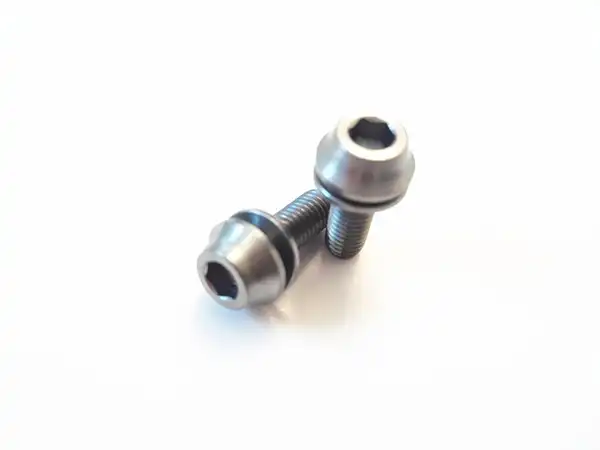
How much weight can be saved by using titanium bottle cage bolts compared to steel or aluminum bolts?
In the realm of cycling, every gram matters. Whether you're a professional racer or a weekend enthusiast, shaving off weight from your bike can lead to enhanced performance and a smoother ride. One often-overlooked component where weight savings can be achieved is the bottle cage bolts. In this article, we'll delve into the question: How much weight can be saved by using titanium bottle cage bolts compared to steel or aluminum bolts?
Understanding the Importance of Bottle Cage Bolts
Security: Bottle cage bolts are responsible for holding the bottle cage firmly onto the bike frame. If these bolts are loose or not properly tightened, the cage can wobble or even detach while riding, potentially causing accidents or loss of hydration.
Weight Distribution: Every gram matters in cycling, especially in competitive racing or long-distance rides. Bottle cage bolts might seem negligible in weight individually, but when combined with other weight-saving strategies, they contribute to overall performance enhancement. Lighter bolts mean less added weight to the bike.
Durability: Titanium bottle cage bolts, in particular, are known for their strength and corrosion resistance. Choosing high-quality bolts ensures longevity and reliability, reducing the need for frequent replacements or maintenance.
Customization: For cyclists who prioritize aesthetics or have specific preferences, bottle cage bolts offer opportunities for customization. Titanium bolts, for example, come in various colors and designs, allowing riders to personalize their bikes according to their style.
Vibration Dampening: Titanium bolts are also prized for their ability to absorb vibrations better than steel or aluminum bolts. This can contribute to a smoother and more comfortable ride, especially on rough terrain.
Enhanced Performance: While the impact of using titanium bolts might seem marginal on its own, when combined with other weight-saving measures, aerodynamic improvements, and performance enhancements, cyclists can experience a noticeable difference in their riding experience.
Exploring Different Bolt Materials
Steel:
Strength: Steel is known for its high strength, making it a reliable choice for bottle cage bolts. It can withstand significant pressure and torque without deforming or breaking.
Weight: Steel is the heaviest among the three materials, which can be a drawback for cyclists aiming to reduce the overall weight of their bikes.
Cost: Steel bolts are generally more affordable compared to aluminum and titanium options.
Corrosion Resistance: While steel can be susceptible to corrosion over time, proper maintenance can mitigate this issue.
Aluminum:
Lightweight: Aluminum is lighter than steel, making it a popular choice for cyclists seeking weight savings without compromising on strength.
Corrosion Resistance: Aluminum naturally forms a protective oxide layer, which enhances its resistance to corrosion.
Cost: Aluminum bolts are typically more expensive than steel but less expensive than titanium.
Strength: While aluminum is not as strong as steel, it still provides sufficient strength for bottle cage bolts under normal riding conditions.
Calculating Weight Savings
To determine the weight savings achievable by using titanium bottle cage bolts, we need to compare them with their steel and aluminum counterparts. While individual bolt weights may vary slightly depending on the manufacturer, we can provide a general estimation based on common industry standards.
Steel bottle cage bolts typically weigh around 6 grams per bolt, while aluminum bolts weigh approximately 3 grams per bolt. Titanium bolts, known for their lightweight properties, weigh roughly 2 grams per bolt.
By switching from steel to Titanium bottle cage bolts, each bolt replacement can save around 4 grams. Similarly, replacing aluminum bolts with titanium ones yields a weight savings of approximately 1 gram per bolt.
Practical Implications of Weight Savings
Improved Acceleration: A lighter bike requires less effort to accelerate, making it easier to get up to speed quickly, whether you're starting from a standstill or accelerating after a corner or descent. This can be particularly advantageous in races or when navigating technical terrain.
Enhanced Climbing Performance: Climbing is where the effects of weight savings are most noticeable. With less weight to haul uphill, cyclists can climb more efficiently, maintain a higher cadence, and experience less fatigue. This can lead to faster ascent times and improved overall climbing performance.
Better Handling: Reduced weight can also improve the bike's handling characteristics. A lighter bike is more responsive to rider inputs, making Titanium bottle cage bolts easier to maneuver through tight corners, technical sections, and obstacles on the trail or road. This can result in a more agile and confidence-inspiring ride experience.
Increased Endurance: Lighter bikes are less taxing on the rider's muscles and energy reserves, especially during long rides or multi-day events. Cyclists can sustain higher speeds with less effort, allowing them to cover greater distances comfortably and potentially improving their overall endurance.
Aerodynamic Benefits: While the primary focus of weight savings is on reducing the bike's mass, lighter components can also have secondary aerodynamic benefits. Streamlined bottle cage bolts, for example, can minimize drag and airflow disruption, contributing to improved aerodynamic efficiency and potentially faster speeds, particularly in races against the clock or in windy conditions.
Psychological Boost: Knowing that your bike is optimized for performance, with every unnecessary gram shaved off, can provide a psychological boost to cyclists. This can increase confidence, motivation, and the overall enjoyment of riding, whether in training sessions, group rides, or competitive events.
Conclusion
In conclusion, the decision to use titanium bottle cage bolts over steel or aluminum ones can lead to notable weight savings without compromising on strength and durability. While the initial investment may be higher, the long-term benefits in terms of enhanced performance and efficiency justify the switch for many cyclists. By understanding the importance of Titanium bottle cage bolts and exploring the weight-saving potential of different materials, cyclists can make informed choices to optimize their riding experience.If you want to learn more about it, welcome to contact us: sales@wisdomtitanium.com.
References:
https://www.cyclingweekly.com
https://www.bikeradar.com
https://road.cc





